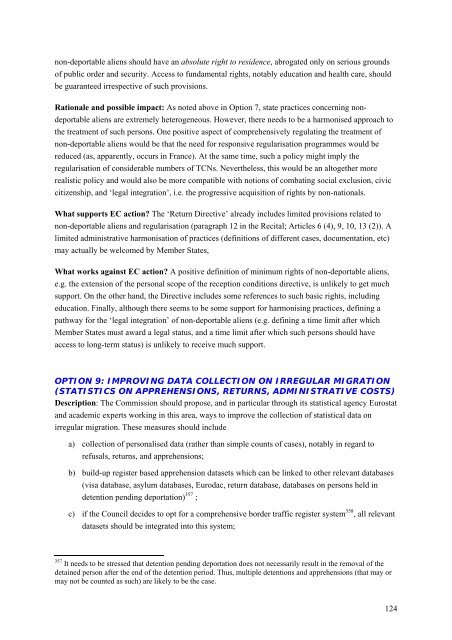REGINE Regularisations in Europe Final Report - European ...
REGINE Regularisations in Europe Final Report - European ...
REGINE Regularisations in Europe Final Report - European ...
Create successful ePaper yourself
Turn your PDF publications into a flip-book with our unique Google optimized e-Paper software.
non-deportable aliens should have an absolute right to residence, abrogated only on serious grounds<br />
of public order and security. Access to fundamental rights, notably education and health care, should<br />
be guaranteed irrespective of such provisions.<br />
Rationale and possible impact: As noted above <strong>in</strong> Option 7, state practices concern<strong>in</strong>g nondeportable<br />
aliens are extremely heterogeneous. However, there needs to be a harmonised approach to<br />
the treatment of such persons. One positive aspect of comprehensively regulat<strong>in</strong>g the treatment of<br />
non-deportable aliens would be that the need for responsive regularisation programmes would be<br />
reduced (as, apparently, occurs <strong>in</strong> France). At the same time, such a policy might imply the<br />
regularisation of considerable numbers of TCNs. Nevertheless, this would be an altogether more<br />
realistic policy and would also be more compatible with notions of combat<strong>in</strong>g social exclusion, civic<br />
citizenship, and ‘legal <strong>in</strong>tegration’, i.e. the progressive acquisition of rights by non-nationals.<br />
What supports EC action? The ‘Return Directive’ already <strong>in</strong>cludes limited provisions related to<br />
non-deportable aliens and regularisation (paragraph 12 <strong>in</strong> the Recital; Articles 6 (4), 9, 10, 13 (2)). A<br />
limited adm<strong>in</strong>istrative harmonisation of practices (def<strong>in</strong>itions of different cases, documentation, etc)<br />
may actually be welcomed by Member States,<br />
What works aga<strong>in</strong>st EC action? A positive def<strong>in</strong>ition of m<strong>in</strong>imum rights of non-deportable aliens,<br />
e.g. the extension of the personal scope of the reception conditions directive, is unlikely to get much<br />
support. On the other hand, the Directive <strong>in</strong>cludes some references to such basic rights, <strong>in</strong>clud<strong>in</strong>g<br />
education. F<strong>in</strong>ally, although there seems to be some support for harmonis<strong>in</strong>g practices, def<strong>in</strong><strong>in</strong>g a<br />
pathway for the ‘legal <strong>in</strong>tegration’ of non-deportable aliens (e.g. def<strong>in</strong><strong>in</strong>g a time limit after which<br />
Member States must award a legal status, and a time limit after which such persons should have<br />
access to long-term status) is unlikely to receive much support.<br />
OPTION 9: IMPROVING DATA COLLECTION ON IRREGULAR MIGRATION<br />
(STATISTICS ON APPREHENSIONS, RETURNS, ADMINISTRATIVE COSTS)<br />
Description: The Commission should propose, and <strong>in</strong> particular through its statistical agency Eurostat<br />
and academic experts work<strong>in</strong>g <strong>in</strong> this area, ways to improve the collection of statistical data on<br />
irregular migration. These measures should <strong>in</strong>clude<br />
a) collection of personalised data (rather than simple counts of cases), notably <strong>in</strong> regard to<br />
refusals, returns, and apprehensions;<br />
b) build-up register based apprehension datasets which can be l<strong>in</strong>ked to other relevant databases<br />
(visa database, asylum databases, Eurodac, return database, databases on persons held <strong>in</strong><br />
detention pend<strong>in</strong>g deportation) 357 ;<br />
c) if the Council decides to opt for a comprehensive border traffic register system 358 , all relevant<br />
datasets should be <strong>in</strong>tegrated <strong>in</strong>to this system;<br />
357 It needs to be stressed that detention pend<strong>in</strong>g deportation does not necessarily result <strong>in</strong> the removal of the<br />
deta<strong>in</strong>ed person after the end of the detention period. Thus, multiple detentions and apprehensions (that may or<br />
may not be counted as such) are likely to be the case.<br />
124
















